Track down free Texas divorce records seamlessly through state and county-level resources.
Some divorce records are accessible for free through a state index; this information can be viewed or ordered through the Clerk of the District Court in the county where the separation was legally finalized and via the Texas Department of State Health Services.
This resource will help anyone interested in finding divorce records in Texas by streamlining the search process and offering helpful links, custodian contact details, and guidance for conducting an efficient lookup. Learn how by using the various methods for obtaining divorce records explained below.
Is Everyone Able To Access Divorce Information in Texas?
Everyone has the right to access divorce records under Texas’ Public Information Act.1 Essentially, the law requires governmental agencies or “bodies” to give the public access to government records they maintain.
Although the law assigns specific mandatory and discretionary exceptions to disclosure based on confidential information, divorce records are not affected. Furthermore, the only vital records (birth, death, marriage, and divorce) that can only be ordered by immediate family are birth and death records. Therefore, this law grants everyone access to public divorce records.
Researchers are granted certain rights pertaining to public records, including:
- Prompt access
- Equal treatment
- Written statement of estimated charges over $40
- Option to inspect and receive copies of information
Government agencies are given parallel responsibilities, including:
- Establishing procedures for inspecting and copying records
- Treating all requestors equally
- Informing requestors of estimated charges over $40
- Informing requestors if records cannot be provided promptly
- Informing third parties when records containing their proprietary information have been requested
As records are required to be produced promptly, in the event they cannot, a government agency must notify the requestor in writing. A government agency may also require a deposit from a requester if the costs exceed $100.
If a government agency fails to release public records, requesters may file a complaint with the Texas Attorney General. For specific complaints regarding overcharges, contact the office at 512.475.2497. For all other complaints, call 877.673.6839.
Texas Attorney General
300 West 15th St.
Austin, Texas 78701
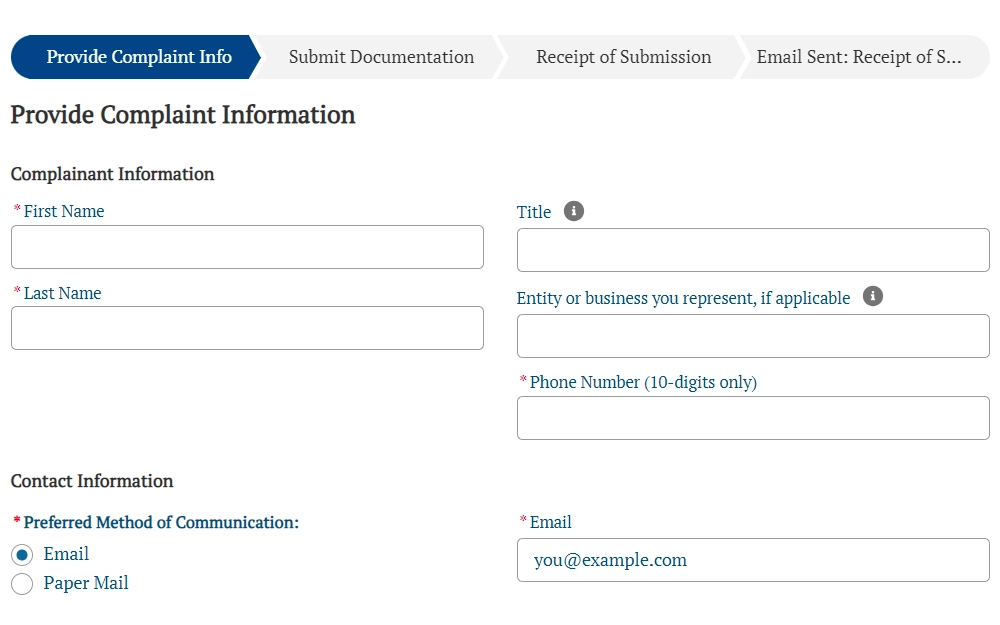
The United States Census Bureau provides free divorce rate information on Texas residents. A report from 2022 indicates that an estimated 9.8% of the adult population in Texas are divorced.
How To Search Texas Divorce Records for Free
When conducting a free public divorce records search, researchers may find they can inspect records for free at district courts. Additionally, the Texas Department of State Health Services provides a free divorce index every year from 1966 to 2017.3
These indexes are made available to the public 5 years after the year ends. For example, the index for the year 2021 will be made available in spring 2026. These indexes show a list of all divorces that occurred in Texas during a respective year.
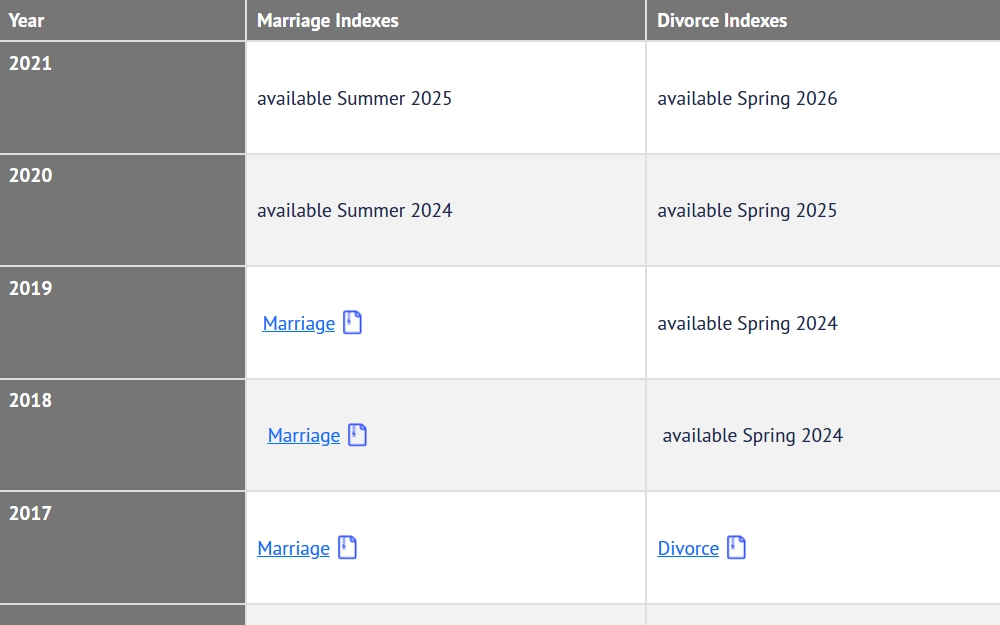
Members of the general public may also order divorce records through the Department of Health. These records will be a divorce verification letter, that shows a divorce took place. Interested persons may order records online, by mail, or in person at the Austin Office or through one of the local offices.
The fastest way is by ordering divorce verification online. Users will be asked to input the divorce date and their personal information.
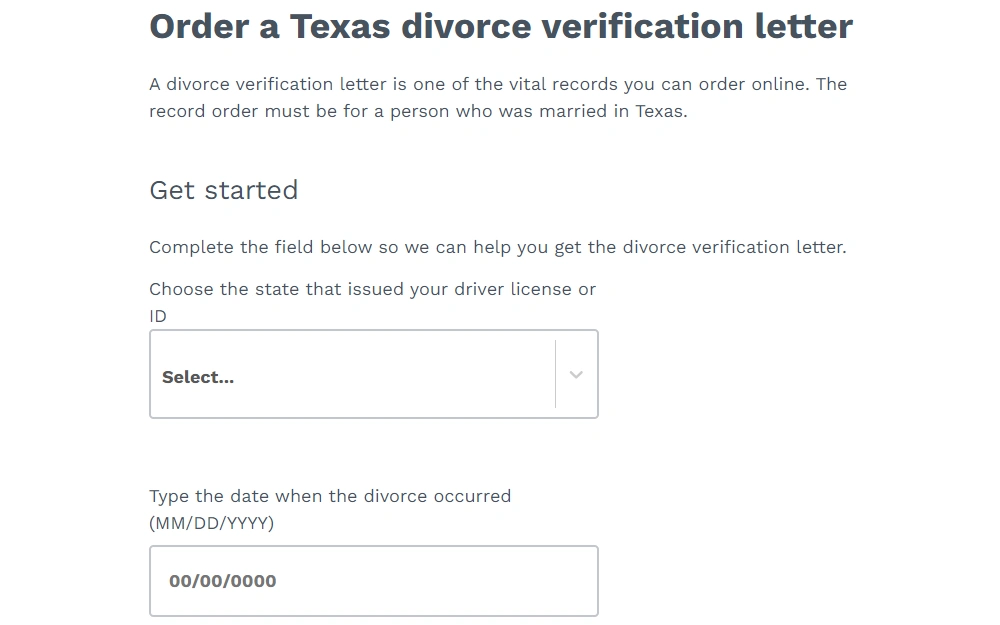
There is a $20 fee payable by credit or debit required at the end of the process. Online orders are received within 20 – 25 business days.
Researchers who wish to order a divorce verification letter in person or via mail must complete an application for marriage or divorce record.
The application must be completed in full, including the requester’s personal information, the information of both spouses and selecting the divorce verification option box. The requester must provide enough details about the parties to the divorce so that the department can locate the right records.
The $20 fee is payable by check or money order to the Texas Department of Health Services. In-person orders are generally processed on the same day.
Mail orders are typically processed in 6 – 8 weeks. However, there are extra fees for expedited processing $5 (20 – 25 business days), overnight return mail $12.50, and express return mail $22.50 (PO box shipping).
Researchers who order records in person should send their applications to one of the local Vital Statistics offices or the Vital Records Austin Office:
Texas Department of State Health Services
Vital Statistics Section
1100 West 49th St.
Austin, Texas, 78756
The office is open to the public 8:00am – 4:00pm Monday – Friday.
Researchers who order records by mail may send their applications to one of two locations, depending on whether the order is expedited.
Regular mail orders:
Texas Department of State Health Services
Vital Statistics Section
PO Box 12040
Austin, Texas 78711
Expedited mail orders:
Texas Department of State Health Services
Vital Statistics Section
MC 2096
1100 West 49th Street
Austin, Texas, 78756
Contact the Vital Records Section at 888.963.7111 for more information or if you have questions.
Retrieving Records of Divorce via Counties in TX
In Texas, divorce records not only include divorce verification letters, but also include divorce decrees. Certified copies of decrees may only be found with the district clerk in the district where the divorce took place.
The local District Clerk offers the public a free online Harris County divorce records search. This search tool has a tab specifically for family court matters, including divorce cases. Researchers only need to input at least one of the parties to a divorce in either the plaintiff or defendant section.
Once a case is located in the list of results, researchers can look up additional case information by clicking on the title of the case. Additional information in provided, including:
- Parties
- Filing Date
- Cast Type
- Case Status
- Judgment Date
- Court
- Judge
- Case History
- Child Financial Support
Researchers may also order part or all of the case records by clicking on the Images tab. Researchers may Add the Entire Case, or add specific documents from the divorce case.
Interested persons can also order divorce records information directly from the Harris County District Clerk by submitting a Public Information Act Request.
Harris County District Clerk
201 Caroline, Ste 420
Houston, Texas 77002
Phone: 832.927.5800
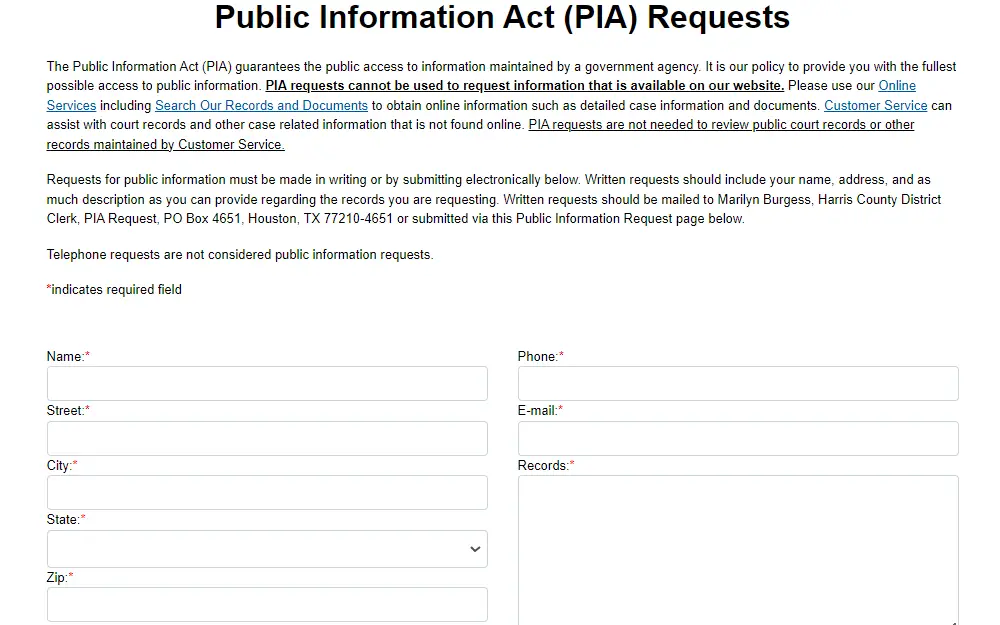
Those interested in ordering copies of divorce records in Dallas County may submit an application to the District Clerk. Researchers must include as much information as possible so the District Clerk can locate the right case. If not, they may be charged a search fee of $5.
Certified copies and uncertified copies may be ordered. Certified copies are $1 per page. Researchers can email requests or mail them; contact information is below:
Dallas County District Clerk
Attn: Family Court Records
George Allen Courts Building
600 Commerce Street, Suite B-30
Dallas, TX 75202
Email: [email protected]
Divorce records may also be ordered in person at the Family Records Desk at the courthouse from 8:00am – 4:30pm Monday – Friday.
George Allen Courts Building
600 Commerce St, Basement B Floor West
Dallas, Texas 75202
Phone: 214.653.6076
Note: Further insight can be found through the Dallas County divorce lookup tutorial.
The Tarrant County Clerk offers members of the public a free divorce records search.6 This tool provides interested persons with divorce-related documents filed with the clerk.
Researchers should select Divorce under the document type and input the name of at least one party to the divorce. Results may be narrowed by also identifying the period when the divorce took place.
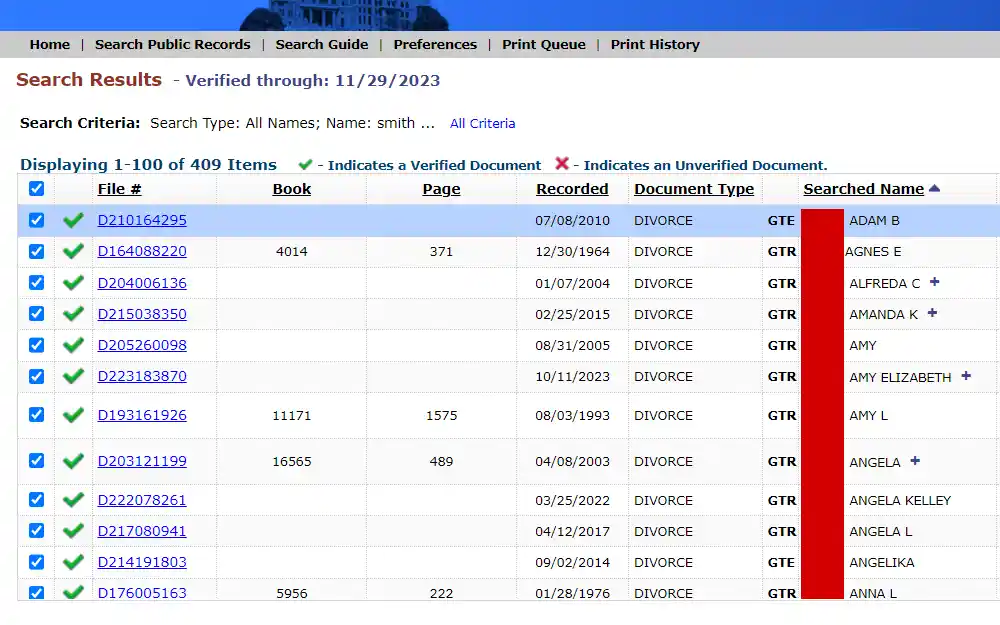
Searchers may also view or order divorce records in Tarrant County through the District Clerk of this region. Members of the public may look up divorce records for free. A member of the Clerk’s Office can perform a basic records search for $5, while advanced searches may cost more.
Standard fees are $1 per page for non-certified copies, while certified copies cost an additional $5 for paper copies. Researchers may use these services at one of the county locations from 8:00am – 5:00pm Monday – Friday.
Tim Curry Justice Center
401 West Belknap St.
Fort Wort, TX 76196
Phone: 817.884.1342
Tarrant County Family Law Center
200 East Weatherford St.
Fort Worth, TX 76196
Phone: 817.884.1114
Tom Vandergriff Civil Court Building
100 North Calhoun St.
Fort Worth, TX 76196
Phone: 817.884.1240
Bexar County provides the public with a free divorce records search. Users only need to input the first and last name of one party to a divorce for the search to yield results. Once results are generated, users can dive deeper into the case information by clicking on the case number.
This will reveal additional information about the divorce, including:
- Parties
- Filing Date
- Court
- Divorce Type
- Case Status
- Case Disposition
- Attorneys
- Case History
Interested parties should contact the Bexar County District Court Clerk about ordering divorce records on anyone in Bexar County.
Bexar County District Clerk
Paul Elizondo Tower
101 West Nueva, Ste 217
San Antonio, Texas 78205
Phone: 210.335.2653
Interested parties may use the free case search to find details of divorces finalized in Travis County. After locating a case, users will be able to find out both parties to the case, the case status and disposition, the case history, and much more. Users are not required to create an account to use the search function.
Researchers may also order records online, by mail, or in person. There is a $5 fee for records searches.
A divorce certificate cost $10, and certified copies cost $5. Emailed copy is $0.10 per page. Mail deliveries cost $3.
Records may be ordered online by filling out a records request. The District Clerk will inform the requester of the cost of the service. The requester has the option to state the limit they are willing to pay for the service.
Mailed requests must be submitted to:
Travis County District Clerk
Records Request
PO Box 679003
Austin, Texas 78767
In-person requests must be dropped off at:
Travis County Family Court Facility
1700 Guadalupe, Rm 3.200
Austin, Texas 78701
County family courts are where interested persons should go when they want to locate historical or archived divorced records; learn more in the section below.
Accessing Free Divorce Archives in Texas for Genealogy Purposes
Texas government agencies do not offer a free divorce archive. The Texas Department of State Health Services does offer divorce information on divorces that occurred after 1968.3 Information on divorces that occurred prior to 1968 may be found by contacting the district clerk’s office in the county where the event took place.
Common Law Marriages & Divorces in Texas
Common law marriage is legally enforceable by statute in Texas.7
People seeking to prove they are in a common law marriage must complete and sign a declaration of their marriage that establishes their intent to be married, and that they swear they are not immediately related by blood or adoption. They must also be at least 18 years of age, live together with their partner, and represent to others that they are married.
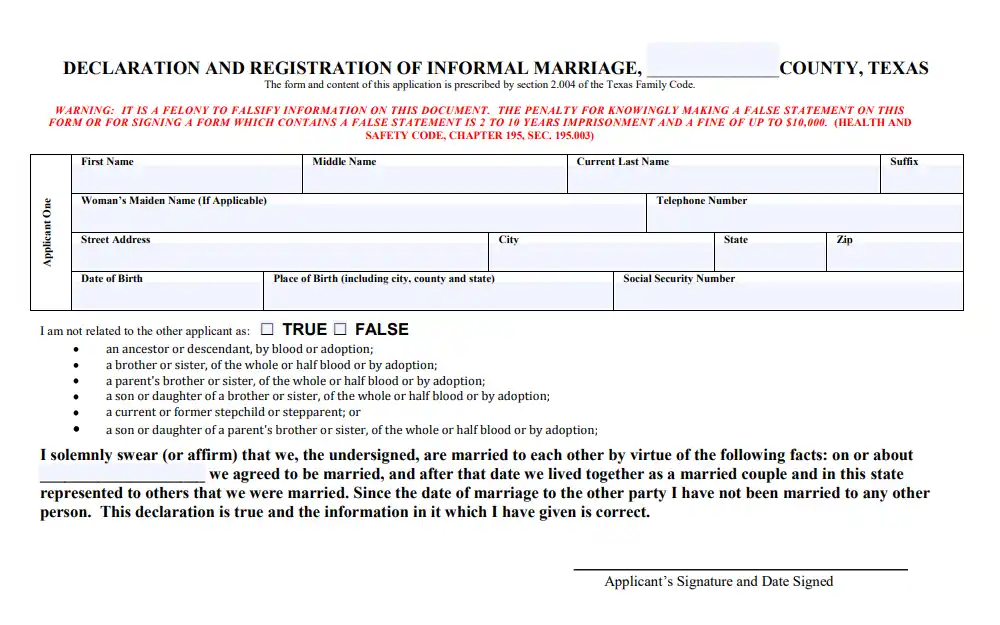
Proving a common law marriage generally becomes important when a relationship breaks down and the parties have community property in common. If the parties have community property in common, how it gets divided depends on if the parties are common law married or not.
While common law divorce is not a thing in Texas, common law marriage is. Therefore, parties to a common law marriage may get a divorce which will set the stage for how to divide community property, children’s living arrangements, etc.
How To View Dissolutions of Marriage & Common Law Divorces in Texas
Texas dissolution of a marriage law states that it means a divorce or annulled marriage.8 Researchers may view or order divorce information in all of the methods described in the sections above, including:
- Online, in person, or via mail through the Texas Department of State Health Services
- Online, in person, or via mail through one of the local county district clerk’s
Annulments are family court judgments declaring a marriage void, meaning the marriage will be treated legally as if it never happened. Information concerning these divorce records can be found by contacting one of the county district clerks.
How To Initiate a Divorce & Address Divorce Petitions in Texas
Before a person is served with divorce, papers there are certain requirements that must be met under Texas divorce law.9 Either the soon-to-be ex-husband or ex-wife must have lived in Texas for at least 6 months prior to filing for divorce, and in the county where they plan to file for the previous 90 days.
The Texas State Library provides free resources for anyone to learn how to get a divorce. They also provide information and forms they need throughout the process.
Individuals must have a ground for divorce. There are two types of divorces in Texas, no-fault and fault. There are two grounds for no-fault divorce – insupportability (generally called irreconcilable differences), and separation from the other spouse for at least three years. There are 4 established grounds for fault-based divorce, including:
- Adultery
- Intentional and persistent physical or mental cruelty
- Imprisonment after a felony conviction
- Abandonment for at least 1 year
There are also two different procedures for a divorce – uncontested or contested. Uncontested divorces mean the spouses reached a marital settlement agreement that covers how to divide the community property, alimony, child support, and custody. It can also mean that the other party has not responded to the divorce proceedings, making it a default divorce.
Contested divorces mean the spouses cannot agree to terms concerning the above factors, and a trial will likely be required.
Either way, the proceeding is initiated by one spouse filing an Original Petition for Divorce and serving it to the other spouse. If the responding spouse wants to file an answer, they must do so within 20 days. The court will then set hearing dates.
The parties may contact each other and undergo mediation to agree to terms. If they cannot agree, the court will decide at a trial.
Filing for divorce in Texas generally costs about $300, not including attorney’s fees.
Anyone can look up divorce records thanks to the Texas Public Information Act; find Texas divorce records by applying the information in this resource to your search, or check out more free TX public records to gain insight into warrants, arrests, background checks, property ownership, and much more.
References
1Texas House of Representatives. (n.d.). Texas Public Information Act. Retrieved December 5, 2023, from <https://house.texas.gov/help/website-policies/texas-public-information-act/>
2Texas Attorney General. (n.d.). Provide Complaint Information. Ken Paxton, Attorney General of Texas. Retrieved December 5, 2023, from <https://oag.my.site.com/OpenRecords/s/flow/CORA_External_Create_Complaint>
3Texas Department of State Health Services. (n.d.). Marriage/Divorce Indexes | Texas DSHS. Texas Health and Human Services. Retrieved December 5, 2023, from <https://www.dshs.texas.gov/vital-statistics/marriage-divorce-records/marriage-divorce-indexes>
4Texas Department of State Health Services. (n.d.). Divorce Verification Letter | DSHS Official Application | Texas.gov. Texas Health and Human Services. Retrieved December 5, 2023, from <https://ovra.txapps.texas.gov/ovra/order-divorce-verification-letter>
5Harris County District Clerk. (n.d.). Public Information Act (PIA) Requests. Office of Harris County District Clerk – Marilyn Burgess. Retrieved December 5, 2023, from <https://www.hcdistrictclerk.com/eDocs/Secure/OpenRecReq.aspx>
6Tarrant County, Texas County Clerk. (2023, November 29). Search Results. Retrieved December 5, 2023, from <https://countyfusion.tarrantcounty.com/countyweb/disclaimer.do>
7Texas Constitution and Statutes. (2005, September 1). FAMILY CODE CHAPTER 2. THE MARRIAGE RELATIONSHIP. Retrieved December 5, 2023, from <https://statutes.capitol.texas.gov/Docs/FA/htm/FA.2.htm#2.401>
8Texas Constitution and Statutes. (1997, April 17). FAMILY CODE CHAPTER 1. GENERAL PROVISIONS. Retrieved December 5, 2023, from <https://statutes.capitol.texas.gov/Docs/FA/htm/FA.1.htm#1.003>
9Texas Constitution and Statutes. (1997, April 17). FAMILY CODE CHAPTER 6. SUIT FOR DISSOLUTION OF MARRIAGE. Retrieved December 5, 2023, from <https://statutes.capitol.texas.gov/Docs/FA/htm/FA.6.htm#6.301>
10Texas Department of State Health Services. (2015, June). Declaration and Registration of Informal Marriage. Texas Health and Human Services. Retrieved December 6, 2023, from <https://www.dshs.texas.gov/sites/default/files/vs/partners/docs/forms/RegistrationInformalMarriage-VS180-1.pdf>
